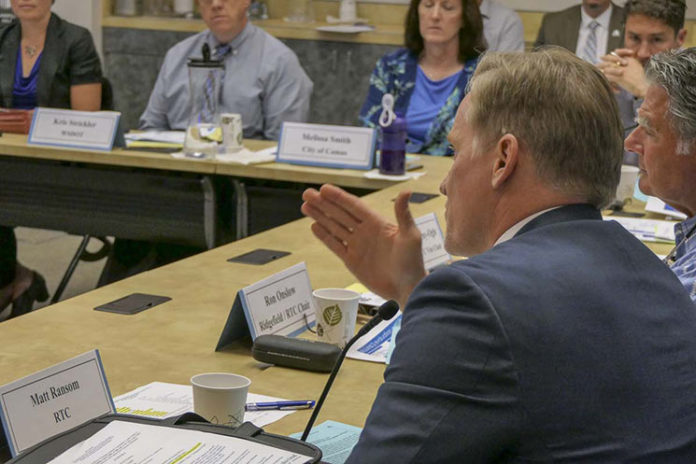
The demise of the Columbia River Crossing (CRC) project undoubtedly set the future of a new Interstate Bridge on I-5 back several years, at least. In the five years since that project stalled out, costing taxpayers more than $170 million, traffic congestion has grown steadily worse, especially for the thousands who call Clark County home but work in Oregon.
Now efforts are underway, on the Washington side of the Columbia River anyway, to revive the conversation over what to do with the 100-year-old I-5 Bridge. Recently, Vancouver City Council members approved a resolution stating their support for a new bridge project. In that statement, mass transit would be a key component of any bridge, including the possible extension of Light Rail into Clark County.
At their council time meeting last week, the Clark County councilors debated their own version of that resolution, but struggled to find consensus on the language around mass transit, as well as whether tolls should be used to help fund a bridge replacement.
While language in the bill says the county supports a fiscally responsible project that considers the economic impact on Clark County families, it doesn’t explicitly come out against the idea of implementing tolls.
“So, the statement from Clark County Council will end up being ‘we don’t care if there are tolls for our citizens,’” said Councilor Jeanne Stewart. “Because we’re not objecting to them.”
Councilor Julie Olson countered that getting into the weeds on such details is premature at this point, since this is just a resolution to express to the governor’s office the importance of the I-5 Bridge project to the future of the region.
“We’re not talking about a project here. There’s not a project identified,” Olson said.
Stewart, who was a Vancouver City councilor when the CRC project was imploding, responded that ambiguous language at this stage can lead to problems down the road.
“It’s going to mutate,” she said. “I’m going to buy a hat for myself today, and in about three or four years, if we don’t see mutations in whatever we thought was our best effort here, I’m going to eat that hat.”
In terms of adding mass transit capacity to the new bridge, all the council members agreed that it should be there in some respect, but most believe that C-TRAN’s new Bus Rapid Transit (BRT) service would be a more cost-effective solution to spending billions bringing Light Rail over from Portland.
“The Oregon side believes that the remedy for congestion is that you don’t go there in a car,” Stewart said. Councilor Eileen Quiring agreed, saying a dedicated BRT lane on the new bridge could represent a significant cost-savings that could be used elsewhere in the project.
Bridge Resolution considered by RTC
On Sept. 4, the I-5 Bridge resolution was a topic at the monthly Southwest Washington Regional Transportation Council (RTC) meeting, which Quiring and Stewart sit on. It is co-chaired by Vancouver Mayor Anne McEnerny-Ogle, who said their resolution was intentionally vague.
“This resolution was simply to ask the governor to put it into his budget to direct WSDOT to start a new project,” she said. “To start the conversation.”
“A conversation has started,” Quiring shot back. “It’s already been named a project of state significance. RTC has had it on their plan for years.”
Rep. Vicki Kraft, of the 17th District, also said it’s her opinion that emphasizing mass transit in the project is a waste of money, considering C-TRAN’s express service currently only carries around 1,500 passengers a day to and from Oregon.
“As of the 2017 financial report, of all the revenues that C-TRAN receives, only 11 percent are from ridership payment,” Kraft said. “So, taxpayers are subsidizing the rest of that entire C-TRAN system. That’s very, very expensive. So, when ‘meeting demand’ is included in this resolution, I don’t think it’s an accurate reflection of the reality.”
Stewart shared the same concern that the resolution RTC was considering adopting spent a lot of language talking about the need for mass transit, and little about addressing existing congestion through adding vehicle lanes.
Carly Francis, Regional Planning director for Washington’s Department of Transportation (WSDOT), said the conversation around mass transit is likely to be different this time around, because C-TRAN’s Bus Rapid Transit service wasn’t around during the ill-fated CRC project.
“And so I think being open to those possibilities makes a lot of sense right now, just to look at what the data says for what reliability can be provided through those transit options looking forward,” Francis said.
The RTC meeting ended with some confusion as Third Bridge Now advocate Sharon Nassett yelled that Director Matt Ransom was lying about the I-5 Bridge project, and some commission members expressed confusion over what they had actually just voted for. Ultimately, the commission moved the resolution, as written, to their next meeting in October for more discussion and a possible vote to approve it.
As for the Clark County Council’s I-5 Bridge resolution, no date has been set for a final vote. The city of La Center is scheduled to vote on a resolution supporting the project at their council meeting next week.



